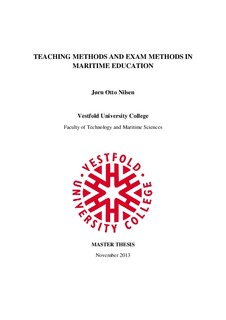Teaching methods and exam methods in maritime education
Master thesis
Permanent lenke
http://hdl.handle.net/11250/2353178Utgivelsesdato
2013Metadata
Vis full innførselSamlinger
Sammendrag
A majority of the marine engineer students begin their education without having any basic knowledge of or experience in the tasks they are expected to perform in the future. Engine room simulators are therefore a significant teaching and learning tool and are today described as an approved method of demonstrating competence in the “International Convention on Standard of Training, Certification and Watchkeeping for Seafarers” (STCW–Convention and Code). Although simulators are seen as the “hub” in the education, the final assessment is conducted by means of a written exam only. The differences between teaching methods and exam methods are a contributory factor to some student’s significant deviation of evaluated competence at part assessment, compared with the results in the final exam. Further, using only a written exam is described as a “narrow” method to demonstrate and evaluate total competence in the vocational education at University College. This thesis aims to investigate students and teachers’ satisfaction with the written exam as form, and if they are not satisfied, the proposal that an assessment method where the simulator is included would provide a better overall competence demonstration and evaluation. There were 18 (n = 18) participants at operational level and 11 (n = 11) participants at management level in the survey conducted among the students. Interviews were conducted among three teachers at operational and management level to triangulate the results. The results show some differences between students at operational level and management level. Students at operational level are moderately satisfied with the written exam, but they believe this method is of limited scope, while the students at management level are not satisfied with this method to demonstrate competence. 55.6 per cent of the students at operational level and 90.9 per cent at management level believe an exam involving simulators is a better way to demonstrate total competence. Teachers at operational and management level believe that assessment methods where simulators are involved in combination with other forms would provide a better total competence evaluation. The teachers pointed out the extrinsic conditions as a reason not to conduct assessments where simulators are involved.
